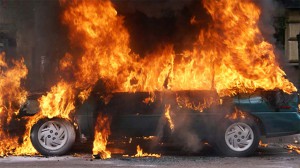Terrorist groups, like Al Qaeda and ISIS, have been known to frequently use car bombs to achieve their ends. But now, it seems, the latter group has become just as willing to sell cars – apparently without explosive options.
Struggling to make up for the loss of revenue from oil as the U.S. and allies target its refineries in Iraq and Syria, the self-described Islamic State has been desperate to find new sources of cash. And its taken to two rather novel approaches, at least for a terror organization, according to a report by Iraqi authorities. These include both car dealerships and fish farms.
“After the armed forces took control of several oil fields Daesh was using to finance its operations, the organization devised non-traditional ways of paying its fighters and financing its activities,” said a report by Iraq’s central court of investigation, quoting Judge Jabbar Abid al-Huchaimi. Daesh is an Arabic term for ISIS.
The hardline group hasn’t negotiated franchise agreements with the likes of Toyota, General Motors or Volkswagen. It has simply taken over the operation of dealerships – as well as fish farms and other enterprises – it seized after taking control of large swaths of Iraq and Syria.
(Why is Tesla’s Musk sleeping on the factory floor? To find out, Click Here.)
ISIS also grabbed a number of refineries in petroleum-rich areas of the two countries, but the Western-led coalition has made those facilities a primary target in the bid to crush the terrorist group. According to a recent report by research firm IHS, ISIS has seen its oil-based revenues tumble to as little as $56 million a month, a one-third decline, since last summer.
“In the recent period, Daesh has gone back to using government factories in the areas it controls – like Mosul – for financial returns,” Huchaimi was quoted by wires services, while adding that oil smuggling from Syrian refineries remains the group’s primary source of international financing.
(Tesla claims it has developed a bio-defense mode for its battery-cars. Click Here for the story.)
It’s not clear how those assaulting ISIS will deal with the latest revenue scheme, though coalition aircraft, including drones, have been scaling up their attacks – often at a devastating cost. Iraqi army fighters finally clawed their way back into the city of Ramadi this spring, but an Associated Press report indicates the town was virtually flattened during the fighting.
As for ISIS car dealerships, the organization faces some serious challenges in operating them. Not only could the facilities be bombed if seen as a strategic terrorist asset, but the group will have problems getting new vehicles after selling off the ones it initially captured. It’s not likely to get fresh supplies from any major automaker anytime soon.
(U.S. vehicle sales soar to near-record levels in April. For more, Click Here.)
And with Daesh on the run, losing a significant amount of territory in recent months, it will have less opportunity to capture new vehicles anytime soon, it seems.

